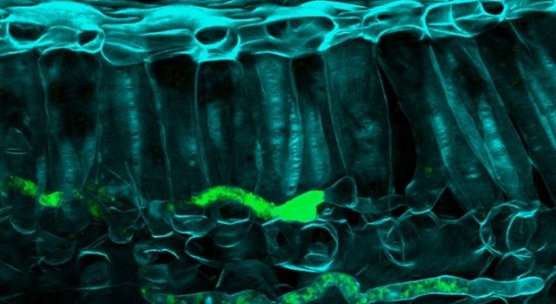Research collaboration discovers potential 'Achilles heel' of potato blight

Scientists working in Scotland and China have uncovered a potential Achilles' heel in the organism which causes potato blight, a global problem with associated costs estimated at $6billion around the world every year.
Blight was the cause of the infamous Irish potato famine in the nineteenth century and remains a huge problem around the world, particularly as more countries turn to potato as a major staple crop and ramp up production. China is now the world's major producer of potatoes.
Scientists at the University of Dundee and James Hutton Institute in Scotland have been working with colleagues at Huazhong Agricultural University, Wuhan, and Heilongjiang Academy of Agricultural Sciences, Harbin, to study ways to prevent the disease.
They have identified a potato enzyme that, if it were removed, could prevent the disease from taking hold.
Professor Paul Birch, who works at both the Division of Plant Sciences at the University of Dundee and the James Hutton Institute, explained, "The potato blight organism seeks help from its host, potato, to cause disease. It does this by creating an association with a host phosphatase enzyme in the potato to form a new holoenzyme that suppresses immunity.
"Once immunity is suppressed, then the blight can take hold in the potato. What this means is that this makes the potato PP1c phosphatase a susceptibility factor – a potato protein that is required for Phytophthora to cause infection.
"This gives us a new avenue to explore to develop a potato crop that would be resistant to blight, something that has potentially huge implications for global food security."
The Dundee-China paper is published in the Nature Communications journal.
Journal information: Nature Communications
Provided by University of Dundee



















